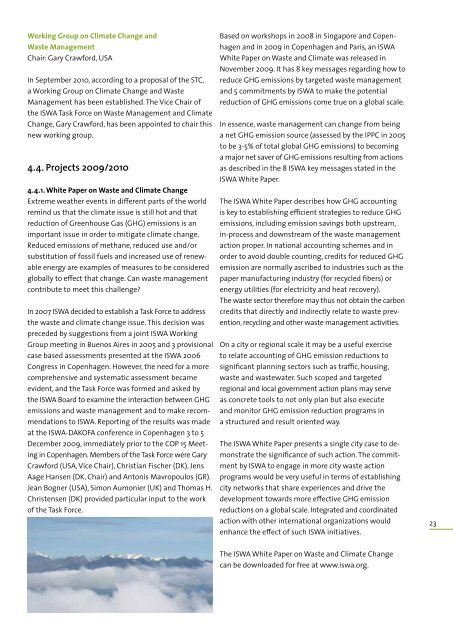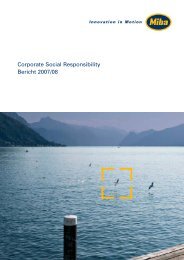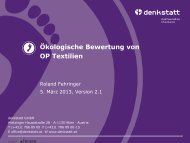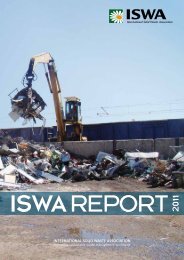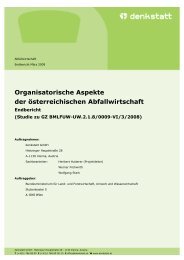INTERNATIONAL SOLID WASTE ASSOCIATION - Denkstatt
INTERNATIONAL SOLID WASTE ASSOCIATION - Denkstatt
INTERNATIONAL SOLID WASTE ASSOCIATION - Denkstatt
Create successful ePaper yourself
Turn your PDF publications into a flip-book with our unique Google optimized e-Paper software.
Working Group on Climate Change and<br />
Waste Management<br />
Chair: Gary Crawford, USA<br />
In September 2010, according to a proposal of the STC,<br />
a Working Group on Climate Change and Waste<br />
Management has been established. The Vice Chair of<br />
the ISWA Task Force on Waste Management and Climate<br />
Change, Gary Crawford, has been appointed to chair this<br />
new working group.<br />
4.4. Projects 2009/2010<br />
4.4.1. White Paper on Waste and Climate Change<br />
Extreme weather events in different parts of the world<br />
remind us that the climate issue is still hot and that<br />
reduction of Greenhouse Gas (GHG) emissions is an<br />
important issue in order to mitigate climate change.<br />
Reduced emissions of methane, reduced use and/or<br />
substitution of fossil fuels and increased use of renewable<br />
energy are examples of measures to be considered<br />
globally to effect that change. Can waste management<br />
contribute to meet this challenge?<br />
In 2007 ISWA decided to establish a Task Force to address<br />
the waste and climate change issue. This decision was<br />
preceded by suggestions from a joint ISWA Working<br />
Group meeting in Buenos Aires in 2005 and 3 provisional<br />
case based assessments presented at the ISWA 2006<br />
Congress in Copenhagen. However, the need for a more<br />
comprehensive and systematic assessment became<br />
evident, and the Task Force was formed and asked by<br />
the ISWA Board to examine the interaction between GHG<br />
emissions and waste management and to make recommendations<br />
to ISWA. Reporting of the results was made<br />
at the ISWA-DAKOFA conference in Copenhagen 3 to 5<br />
December 2009, immediately prior to the COP 15 Meeting<br />
in Copenhagen. Members of the Task Force were Gary<br />
Crawford (USA, Vice Chair), Christian Fischer (DK), Jens<br />
Aage Hansen (DK, Chair) and Antonis Mavropoulos (GR).<br />
Jean Bogner (USA), Simon Aumonier (UK) and Thomas H.<br />
Christensen (DK) provided particular input to the work<br />
of the Task Force.<br />
Based on workshops in 2008 in Singapore and Copenhagen<br />
and in 2009 in Copenhagen and Paris, an ISWA<br />
White Paper on Waste and Climate was released in<br />
November 2009. It has 8 key messages regarding how to<br />
reduce GHG emissions by targeted waste management<br />
and 5 commitments by ISWA to make the potential<br />
reduction of GHG emissions come true on a global scale.<br />
In essence, waste management can change from being<br />
a net GHG emission source (assessed by the IPPC in 2005<br />
to be 3-5% of total global GHG emissions) to becoming<br />
a major net saver of GHG emissions resulting from actions<br />
as described in the 8 ISWA key messages stated in the<br />
ISWA White Paper.<br />
The ISWA White Paper describes how GHG accounting<br />
is key to establishing efficient strategies to reduce GHG<br />
emissions, including emission savings both upstream,<br />
in-process and downstream of the waste management<br />
action proper. In national accounting schemes and in<br />
order to avoid double counting, credits for reduced GHG<br />
emission are normally ascribed to industries such as the<br />
paper manufacturing industry (for recycled fibers) or<br />
energy utilities (for electricity and heat recovery).<br />
The waste sector therefore may thus not obtain the carbon<br />
credits that directly and indirectly relate to waste prevention,<br />
recycling and other waste management activities.<br />
On a city or regional scale it may be a useful exercise<br />
to relate accounting of GHG emission reductions to<br />
significant planning sectors such as traffic, housing,<br />
waste and wastewater. Such scoped and targeted<br />
regional and local government action plans may serve<br />
as concrete tools to not only plan but also execute<br />
and monitor GHG emission reduction programs in<br />
a structured and result oriented way.<br />
The ISWA White Paper presents a single city case to demonstrate<br />
the significance of such action. The commitment<br />
by ISWA to engage in more city waste action<br />
programs would be very useful in terms of establishing<br />
city networks that share experiences and drive the<br />
development towards more effective GHG emission<br />
reductions on a global scale. Integrated and coordinated<br />
action with other international organizations would<br />
enhance the effect of such ISWA initiatives.<br />
23<br />
The ISWA White Paper on Waste and Climate Change<br />
can be downloaded for free at www.iswa.org.


